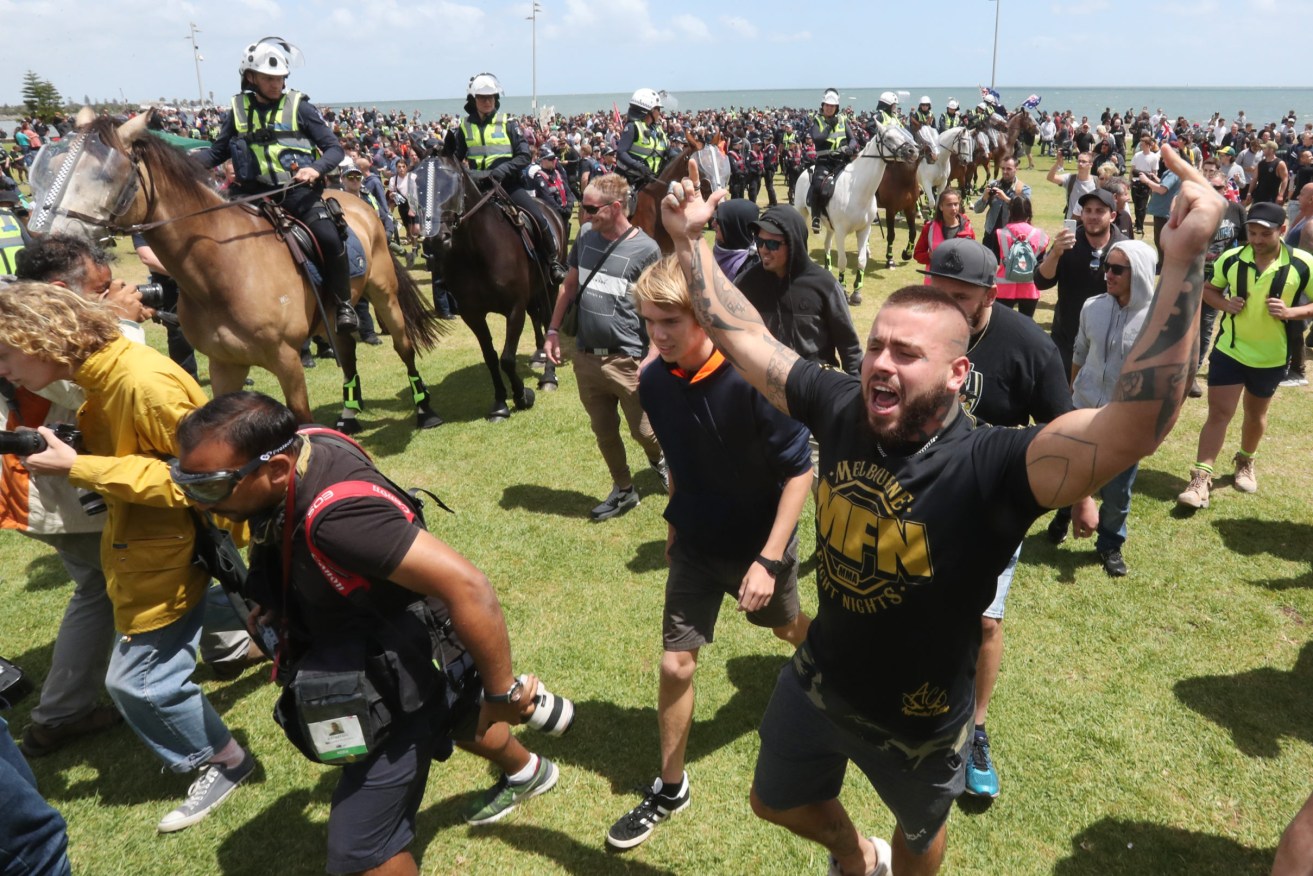Hate crimes surging in Queensland, right-wing extremism a growing threat
Crimes with an element of hate or vilification may have increased 30 per cent in five years but official statistics underestimate the scale of the problem.

Police keep protesters apart on the St Kilda foreshore in Melbourne as far right wing activist Neil Erikson hosts "political meeting". A Parliamentary inquiry has warned that hate crimes and right-wing extremism is in the rise in Queensland.(AAP Image/David Crosling)
Queensland police, State Government bureaucrats and community representatives today gave evidence to a parliamentary committee examining the need for a stronger response to serious vilification and hate crimes.
Acting Assistant Commissioner Keiryn Dermody, from Security and Counter-Terrorism Command, said police officers noted on an internal database whether they believed there was an element of hate or vilification linked to an alleged offence.
While that data has its limitations, Dermody said racial vilification was recorded 30 per cent more in 2020 than it was five years earlier, partly due to “increased experiences of racially based vilification occurring in the context of COVID-19.”
Dermody said governments had acknowledged that “ideological and religiously motivated violent extremism presents a growing threat to the safety of the community” however it still represented only a small proportion of the overall problem of targeted offences.
In Queensland, if warranted, police can charge someone with an offence of serious racial, religious, sexuality or gender identity vilification under the Anti-Discrimination Act, carrying a maximum penalty of six months in jail. But officers need the written approval of Crown Law to do so.
The committee heard police often sought a more immediate outcome by relying on general offences – for example, assault or public nuisance offences, or relying on Commonwealth internet laws to respond to online abuse – and then informing prosecutors of the hate or vilification aspects.
As a result, the vilification offence has only been used eight times, with three convictions.
Inspector Peter Doyle, from Security and Counter-Terrorism Command, acknowledged that seeking a more immediate outcome could have longer term implications for policing.
“The community feedback can be that it doesn’t reflect the gravity of the situation, it doesn’t bring in the fact there was an underlying attitude or approach,” Doyle said.
Multicultural Australia CEO Christine Castley said police and Crown Law practices had already undermined the relationship between communities and authorities in Queensland. She pointed to instances of explicit and offensive graffiti on mosques being regarded as a public nuisance offence, not even elevated to wilful damage – let alone vilification.
“There needs to be some form of legislative reform,” Castley said, agreeing that could include removing the need for police to obtain consent from Crown Law, or new powers similar to domestic violence orders.
Senior bureaucrat Wayne Briscoe, from the Department of Children, Youth Justice and Multicultural Affairs, told the committee there was underreporting of crime in ethic and multicultural communities. He was recently told of rocks being thrown at religious buildings, and motorists using racial slurs and spitting, only for victims to lack confidence that any complaint would be acted upon.
Briscoe said that reflected on perceptions of the Queensland community more broadly and “a level of acceptance that shouldn’t be there”. He pointed to a headline in The Courier-Mail last year, ‘Enemies of the State,’ that caused ongoing damage to relationships.
“It was obvious that these people were from African background,” Briscoe said.
“That was very distressful, obviously, for members of African communities and for people working with those communities. It’s very real.”
Castley said people from non-English speaking backgrounds also faced other impediments, such as a lack of translation services. She referred to the recent case of a young person racially harassed at school, and then assaulted by a group of students in a bathroom, with a recording of the assault then uploaded to TikTok. She said police told the victim not to return to school but the parents struggled to engage with authorities due to the language barrier.










